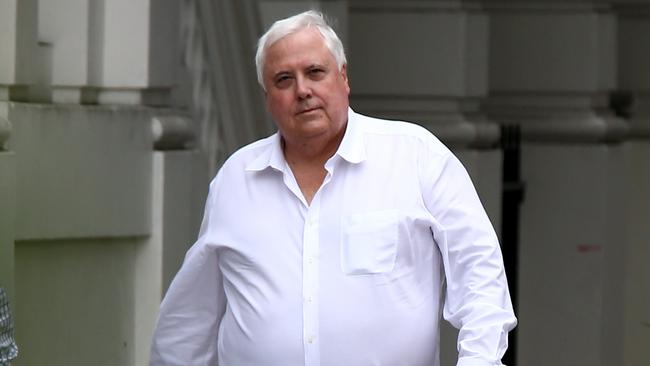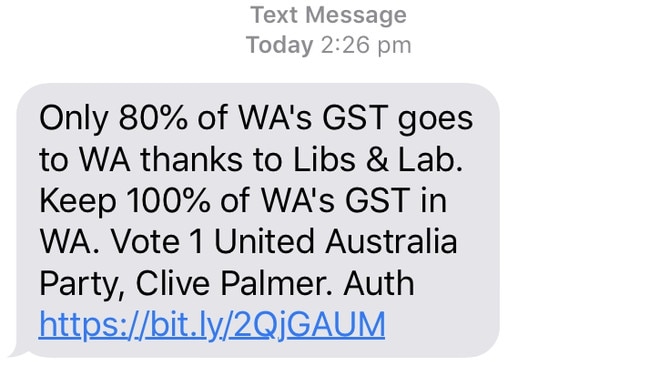Palmer’s weekend campaign was yet another failure
Clive Palmer’s unsolicited text message blast was not only unwelcome for most recipients, it was also dumb and ineffective campaigning, writes Paul Williams.
Rendezview
Don't miss out on the headlines from Rendezview. Followed categories will be added to My News.
One of the few things on which I agree with departing Senator David Leyonhjelm is that the right to free speech does not extend to the right to be heard.
While businesses and politicians enjoy every right to advertise truthfully and inoffensively, no one can force us to engage with their adverts. It’s a basic tenet of democracy.
That free speech exists in Australia, even without explicit constitutional reference, is therefore immutable. When, for example, the Hawke Labor Government legislated in 1991 to ban political adverts on radio and television — because their great expense creates an uneven playing field for low budget parties — the High Court in 1992 ripped up the law, insisting a ban on adverts contravened Australia’s implied right to free speech.
But no reasonable government — and no common sense court of review — would say Australians must watch those political adverts to properly complete the free speech equation.
Most of us therefore walk the fine line between free speech and privacy reluctantly. We are bombarded with adverts and emails which we are free to ignore while, simultaneously, we know we must be prudent in what we say, and whose ears we’re assaulting when we say it.
RELATED: Clive Palmer spams Australians with unsolicited texts
On a regular basis, for example, I’m barraged with egregious emails from disturbed strangers attempting to insult me by shouting foul opinions on race, gender and global conspiracies. They wrongly believe they enjoy the (unlimited) right to abuse me with filth because I enjoy my own (limited) right to an opinion.
Of course, I keep the sender’s initial email on file for police and lawyers should I need later evidence, then I permanently block the person from my email. I never know if the tirade continues because a troll’s alleged right to abuse does not extend to my obligation to read that abuse.

That brings me to the already fine line between free speech and privacy that became substantially thinner last week as Clive Palmer’s United Australia Party came under attack for bombarding voters with countless thousands of unsolicited text messages that promise pie-in-the-sky populism.
There’s so much wrong with Palmer’s approach I don’t know where to begin.
But Palmer is right when he says he’s done nothing wrong, and that the law allows him to swamp swinging voters with tacky political adverts. After all, the Do Not Call Register — launched nationally in 2007 under John Howard to offer protection to families from telemarketers — deliberately excluded charities and political parties from the legislation. Since then, “Save the Cane Toad” and the “Flat Earth Party” have had carte blanche to court your support during dinner.
RELATED: Twisted Sister declares war on Clive Palmer for unauthorised use of their song
Clearly, that must change. As above, the right of businesses, charities and political parties to canvass for custom from willing Australians does not equal the right to browbeat the unwilling.
And that’s before we begin to ask exactly from where political parties and others get our private phone numbers? The truth is that, like Facebook, political parties probably know you better than your partner does. If you’ve ever contacted an MP, joined an online group, signed an e-petition or made any sort of even remotely political statement online, a political party somewhere has worked out what issues affect you and what your political preferences are likely to be.

Moreover, because personal information, including phone numbers, is hot marketing property, it’s impossible to contain it. Sadly, so much of your digital profile is being bought and sold on a daily basis, including by political interests.
That takes us back to Clive and why his unsolicited SMS campaign is likely to backfire. Quite apart from the angry backlash Palmer has now generated among potential supporters whose privacy he’s just invaded, Clive has used a now obsolete marketing tool. After the backlash Labor copped in 2016 over its “Mediscare” SMS campaign, the shelf-life of text-campaigning has passed.
But Clive also used the blunt end of SMS tactics that ignores focused targeting. Just how many Queensland votes does Palmer think he’ll harvest with promises of a fast train between Sydney and Melbourne?
In short, voters cotton on to innovations in political marketing at an astonishing rate. What works this year won’t work in 2022. Today, the untargeted SMS is as about useful as the letterbox flyer.
That brings us to Palmer’s breaking of political the cardinal rule of campaigning: don’t tell, show. Whether on TV, radio, text or billboards, Palmer fails to demonstrate his accusation the major parties are failing us. Instead, he just tells, or worse, shouts.
And, whether in text, email or in person, nobody likes a loudmouth.
Dr Paul Williams is a senior lecturer at Griffith University.


